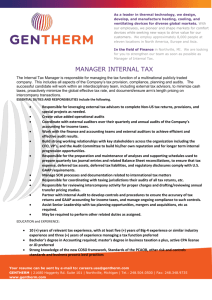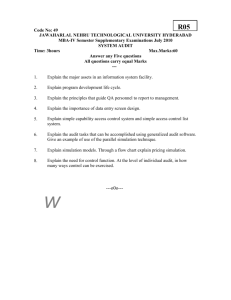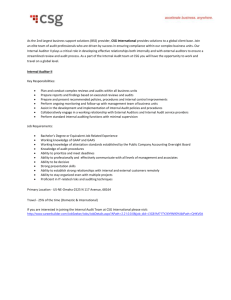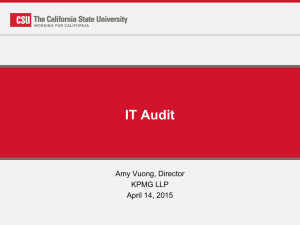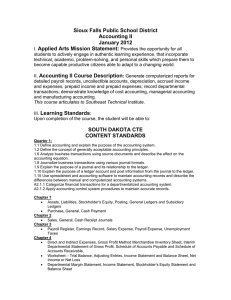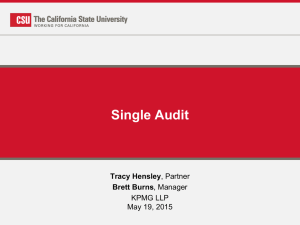(IT) Audit - The California State University
advertisement
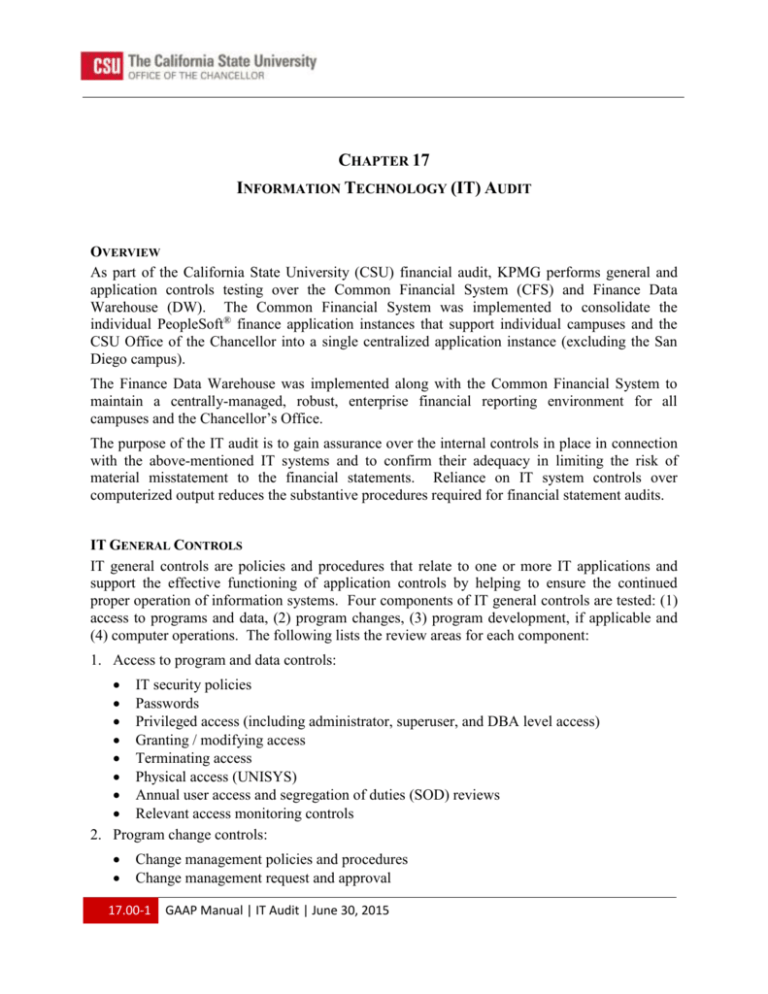
. CHAPTER 17 INFORMATION TECHNOLOGY (IT) AUDIT OVERVIEW As part of the California State University (CSU) financial audit, KPMG performs general and application controls testing over the Common Financial System (CFS) and Finance Data Warehouse (DW). The Common Financial System was implemented to consolidate the individual PeopleSoft® finance application instances that support individual campuses and the CSU Office of the Chancellor into a single centralized application instance (excluding the San Diego campus). The Finance Data Warehouse was implemented along with the Common Financial System to maintain a centrally-managed, robust, enterprise financial reporting environment for all campuses and the Chancellor’s Office. The purpose of the IT audit is to gain assurance over the internal controls in place in connection with the above-mentioned IT systems and to confirm their adequacy in limiting the risk of material misstatement to the financial statements. Reliance on IT system controls over computerized output reduces the substantive procedures required for financial statement audits. IT GENERAL CONTROLS IT general controls are policies and procedures that relate to one or more IT applications and support the effective functioning of application controls by helping to ensure the continued proper operation of information systems. Four components of IT general controls are tested: (1) access to programs and data, (2) program changes, (3) program development, if applicable and (4) computer operations. The following lists the review areas for each component: 1. Access to program and data controls: IT security policies Passwords Privileged access (including administrator, superuser, and DBA level access) Granting / modifying access Terminating access Physical access (UNISYS) Annual user access and segregation of duties (SOD) reviews Relevant access monitoring controls 2. Program change controls: Change management policies and procedures Change management request and approval 17.00-1 GAAP Manual | IT Audit | June 30, 2015 . Change management testing Access to migrate changes 3. Program development controls: System development lifecycle System and acceptance testing Data validation Production cutover checklist 4. Computer operations controls: Job processing Backup procedures Restoration testing Access to backup tapes Incident management Unisys SOC1 report review IT APPLICATION CONTROLS IT application controls apply to the processing of transactions by individual IT applications. These controls help ensure that transactions occurred, are authorized, and/or are completely and accurately recorded and processed. IT application controls are manual or automated procedures that typically operate at a business process level and apply to the processing of transactions by individual IT applications. IT application controls may be automated controls or manual controls with an automated component. The objective of the automated control is to prevent, detect and/or correct a misstatement of financial data. Types of IT application controls include: System configuration/account mapping; Generation and review of exception/edit reports; Interface controls; System access, including enforcement of segregation of duties policies. Relevant IT application controls are linked to specific IT applications at the process level. Additionally, each relevant IT application is identified with the relevant IT general control environment(s) and related IT general control elements. As such, if the IT environment is found to be operating effectively as a result of the IT general controls test procedures, KPMG IT will conduct testing over select IT application controls as determined by the KPMG financial audit team. The auditors review and test the automated IT general and IT application controls by performing walkthroughs (i.e. performing interviews and observations of the processes with IT and business process owners), system tests (e.g. observing and reviewing configurations established within the IT application), and selecting one representative sample (e.g. observing a sample transaction flowing through the entire process). For relevant manual controls, the auditors will obtain an understanding of the process and select appropriate samples based on the frequency of 17.00-2 GAAP Manual | IT Audit | June 30, 2015 . occurrence of the control (e.g. daily frequency equates to a minimum of 15 samples, based on the risk of failure of the control). ROLL-FORWARD PROCEDURES Roll-forward procedures may include performing corroborative inquiry of appropriate CSU personnel regarding any IT environment and control changes that may have occurred since testing, obtaining additional samples for review, and obtaining 4th quarter reports prepared after the June 30 year end. These procedures are performed to determine whether there have been significant changes or modifications to the existing IT control environment, IT processes, control descriptions and activities, and process owners since the original testing of the controls (i.e. during interim testing) through June 30. During the roll-forward period, the auditors will consider the following matters that might affect the conclusions reached during interim testing for control operating effectiveness: Individuals responsible for the oversight and operation of the controls and ensuring the same people are not assigned to both. The sufficiency of the evidence of effectiveness obtained at the interim date. New or significant modifications to client IT systems. Significant modifications to existing processes, including process reengineering. Significant new positions or changes in job roles or responsibilities, including employee turnover. Indicators of fraudulent activity or errors. Changes in the client’s regulatory environment. TIMING Fieldwork generally occurs in the months of April through June. Roll-forward procedures are conducted after June 30, generally in July. 17.00-3 GAAP Manual | IT Audit | June 30, 2015 . REVISION CONTROL Document Title: CHAPTER 17 – IT AUDIT REVISION AND APPROVAL HISTORY Section(s) Revised Summary of Revisions None. 17.00-4 GAAP Manual | IT Audit | June 30, 2015 Revision Date




